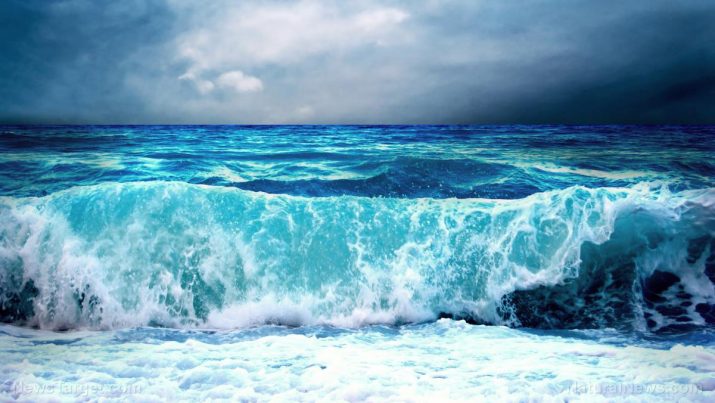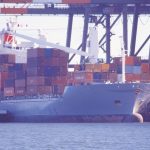
Humans are making oceans noisier, hurting all marine life
Friday, February 19, 2021 by Divina Ramirez
http://www.naturalnewsresearch.com/2021-02-19-human-noise-pollution-ocean-hurts-marine-life.html

The underwater realm is full of sounds – water churning, whales howling and corals popping. But according to a recent review, humans have terribly altered the ocean soundscape over the past few centuries. Today, sounds that mark healthy ocean life are drowned out by an increasingly loud cacophony of man-made noise.
The review, published in the journal Science, was based on evidence contained across over 10,000 studies. Led by Carlos Duarte of King Abdullah University of Science and Technology in Saudi Arabia, an international team of researchers analyzed the studies to determine the effect of human noise pollution on ocean life.
Roughly 90 percent of the studies showed that human noise pollution caused significant harm to many marine mammals, including whales, seals and dolphins. Around 80 percent of the studies also showed that man-made noise negatively impacted fish and vertebrates.
Sound is a fundamental component of marine ecosystems, as fish and marine mammals rely on sound to move around and communicate. The review indicates that the impact of man-made noise is so pervasive that it hurts ocean animals at all levels. “The soundtrack of home is now hard to hear,” warned Duarte.
Urgent need for action
The depths of the oceans are often thought of as a silent world. But that was never the case, and they have only become noisier as humans advanced technologically.
There is now a growing underwater din from shipping, coastal industries, off-shore oil rigs and wind farms. All have had a negative impact on ocean animals that now struggle to hear their own sounds above the din.
Duarte and his colleagues state that the damage caused by noise is just as harmful as pollution and overfishing. Yet it is being dangerously overlooked.
For their review, the group set out to assess the impact of noise on marine animals and ecosystems around the world. They consolidated evidence from more than 10,000 studies showing how man-made noise impacts marine vertebrates and invertebrates across multiple levels, from their behavior to physiology.
They found overwhelming evidence that anthropogenic or man-made noise hurt marine animals by disrupting their behavior, physiology and reproduction and, in extreme cases, causing mortality.
For instance, low-frequency noise along shipping routes, which jumped 32-fold in the last half-century, harms marine mammals by damaging their hearing and greatly hindering their ability to communicate. The noise makes it hard for young fish to find their way home since they rely on hearing to find the reef.
But unlike fish, marine mammals cannot create new sensory receptors for hearing. Once the receptors are damaged, marine mammals may suffer chronic hearing damage or hearing loss. And because they rely on hearing to survive in the ocean, hearing damage may greatly raise their risk of mortality.
Meanwhile, dynamite fishing remains a major source of noise in Southeast Asia and coastal Africa, while deep-sea oil and gas drilling continues to create noise in the North Sea. In addition, seismic surveys used to map geological structures creates noise as well because it utilizes a sonic cannon to pound on the seafloor.
Even climate-friendly activities like building offshore wind farms can increase sound levels. Additionally, land traffic on structures like bridges also produces low-level noise that can penetrate underwater. (Related: One MORE way humans harm marine ecosystems: Noise.)
Even if these noises do not harm fish and marine mammals, they can eventually drive them away. Duarte says this can harm marine animals’ populations because they are moving away from their food sources and breeding grounds. This is how man-made noise can undermine biologists’ conservation efforts.
Overall, the review highlights the need to mitigate the impact of anthropogenic noise on marine life to achieve a healthier ocean. But the good news is, man-made noise is one of the easiest stressors to fix. When humans “switch off” the noise, the impact disappears. The same cannot be said for plastic pollution or overfishing.
In light of their findings, Duarte and his colleagues call for anthropogenic noise to be included in assessments of cumulative pressures on marine ecosystems. The findings also call for national and international policies to become more ambitious in regulating technological solutions to mitigate marine noise pollution.
Go to OceanHealthNews.com for more articles on ocean health and marine life.
Sources include:
Tagged Under: Tags: badpollution, discoveries, Ecology, environment, marine life, noise pollution, ocean health, oceans
RECENT ARTICLES


ODMS: Oxygen Deprivation Mask Syndrome now sweeping across the globe
By S.D. Wells

Huge spike in ship emissions due to ships idling in ports
By Cassie B.

Case study finds plant-based diet can stop chronic headaches

Study: Lego plastic toys can last 1,300 YEARS in the ocean before breaking down
COPYRIGHT © 2017 NATURAL NEWS RESEARCH


